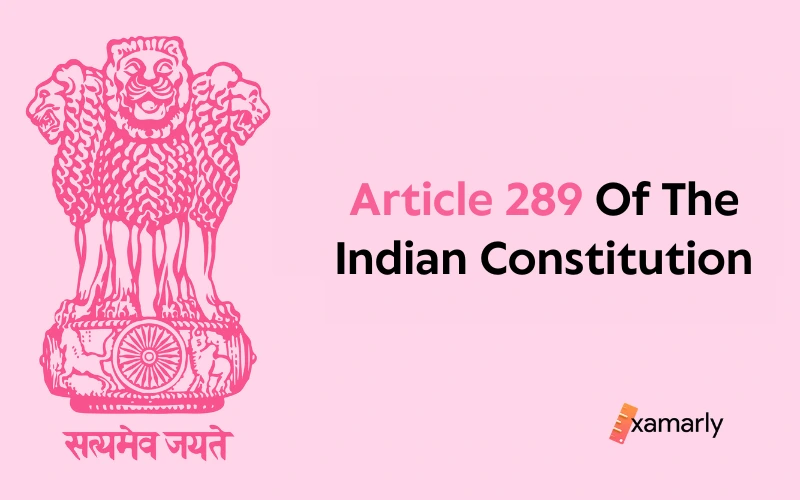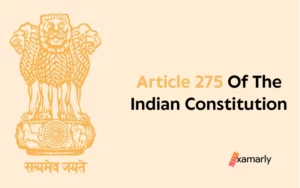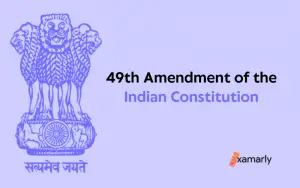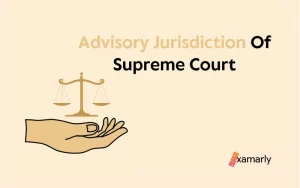An Overview
When it comes to the relationship between the Union government and the State governments in India, there is often a question of taxation.
The Union government, which oversees the entire country, is not completely prohibited from taxing the State government’s activities. In fact, it has the power to impose taxes on certain business, operations or property used or occupied by the State government. However, this power is not absolute, it can only be exercised to the extent allowed by a law passed by the Parliament.
Article 289 of the Indian Constitution is a constitutional provision that deals with the aspect of taxation and the imposition of tax by the Union on the State governments.
In this blog, we will delve deeper into Article 289 of the Indian Constitution and examine how it regulates the relationship between the Union government and State governments in terms of exemption from taxes as well as the collection of taxes. We will learn about the background, clauses and their explanation, and some frequently asked questions related to the article.
- An Overview
- Background Of Article 289 Of The Indian Constitution
- What Does Article 289 Of The Indian Constitution Deal With?
- Clause (1) of Article 289 Of The Indian Constitution: Explained
- Clause (2) of Article 289 Of The Indian Constitution: Explained
- Clause (3) of Article 289 Of The Indian Constitution: Explained
- Summing Up
- FAQs Related To Article 289 Of The Indian Constitution
- Which Article Of The Indian Constitution Holds The Provisions For Exemption Of Property And Income Of A State From The Union taxation?
- Can The Union Government Override The Provisions Of Article 289 Of The Indian Constitution And Impose Taxes On The Property And Income Of A State?
- What Are The Implications Of The Exemption Of Property And Income Of A State From Union Taxation?
- How Does The Exemption Of Property And Income Of A State From The Union Taxation Align With The Principles Of Federalism?
- What Is The Purpose Behind Article 289 Of The Indian Constitution?
- What Does Clause (2) Of Article 289 Of The Indian Constitution Talk About?
- How Does The Provision Provided In Clause (3) Of Article 289 Of The Indian Constitution Relate To Clause (2) Of The Same Article?
Background Of Article 289 Of The Indian Constitution
First, let us make ourselves familiar with the background of Article 289.
- The draft version of Article 266 was discussed during the meeting of the Constituent Assembly. This was done on September 9, 1949. This Draft Article was later referred to as Article 289 in the Constitution of India, 1950.
- This Draft Article dealt with how the Union government would be able to tax a State Government. It prohibited the Union government from imposing taxes on lands, buildings, or income generated within the State. However, it did allow it to tax the State Government on its trade or business.
- Additionally, the Draft Article 266 also permitted the Union government to tax the rulers of princely states on their personal property and income.
- The Chairman of the Drafting Committee suggested a change to the original Draft Article. This revision would prevent the Union government from imposing taxes on the property and income of the State governments.
- However, this amendment to the Draft Article would allow the Parliament to pass a law. This law would grant the Union with the authority to tax income from the trade or business of the State governments. It would, however, exclude any trade or business that the Parliament declares as being incidental to the ordinary functions of government.
- Many members of the Assembly proposed several amendments. These were done with the intention to curb the limit of the Union’s power to tax the State governments. Their proposals comprised of excluding certain types of trade and business carried out within the State or that were already established before the constitution was put into effect, as well as development and expansion programs of the State government whose preparations were complete.
- The Finance Minister assured the members of the Assembly that the public utility undertakings would be exempt from taxation. He also added that there would be no discrimination in the taxation of industrial undertakings between the Union and the State governments. The proposed amendments were withdrawn only after the above-mentioned assurances were promised.
- On September 9, 1949, the Assembly approved the Draft Article and adopted it into the Constitution of India after it was amended by the Chairman of the Drafting Committee.
What Does Article 289 Of The Indian Constitution Deal With?
Article 289 deals with the provisions revolves around the levying of taxes. The opening line of this article gives away that the article holds provisions that provide immunity to the States against any sort of taxation that may be levied by the Union government on the property as well as income that is under the possession and ownership of the State government.
Clause (1) of Article 289 Of The Indian Constitution: Explained
(1) The property and income of a State shall be exempt from Union taxation.
The first clause of Article 289 is very simple and straight forward. It clearly states that all of the property that is under the ownership of the State shall not be liable to payment of taxes levied by the Union government. The same applies for the income that is generated by a State government. This is what is meant by the initial clause of this article.
Clause (2) of Article 289 Of The Indian Constitution: Explained
(2) Nothing in clause (1) shall prevent the Union from imposing, or authorising the imposition of, any tax to such extent, if any, as Parliament may by law provide in respect of a trade or business of any kind carried on by, or on behalf of, the Government of a State, or any operations connected therewith, or any property used or occupied for the purposes of such trade or business, or any income accruing or arising in connection therewith.
The second clause of Article 289 of the Indian Constitution makes it very clear that the Union government has the power to impose taxes only on certain activities of the State government. Specifically, it states that the Union government can impose taxes on any trade or business of any kind carried on by, or on behalf of, the Government of a State, or any operations connected with such trade or business.
In addition to this, the Union government can also impose taxes on any property used or occupied for the operation of such trade or business, or any income that is generated or arising in connection with such trade or business.
This means that if the State government is engaged in any kind of commercial activities, such as running a factory or a business, the Union government has the power to impose taxes on the property used for the operation of that business. This could include the land, buildings, and equipment used for the business. The Union government also has the power to impose taxes on any income that comes from that business. This means that if the State government is earning revenue from a particular business or the generation of income from trade, the Union government has the power to tax that income.
It is important to note here that, this power of the Union government to impose taxes on the State government’s activities is not absolute. The provision contained in the clause states that the Union government can only impose taxes to the extent that it is authorised by a law passed with the permission of Parliament. This means that the Union government’s power to impose taxes on the State government’s activities is subject to the will of the Parliament owing to its legislative power. The Union government can only act as per the limits defined by the Parliament due to its legislative authority.
In addition, this provision also ensures that the State government’s financial autonomy is preserved. The State government manages its own resources and finances and the Union government can not interfere in this. At the same time, the Union government has been given the power to impose taxes on the State government’s commercial activities if it is deemed to be necessary, this ensures that the Union government has the revenue resources it requires to provide services and implement policies.
When the provision of this article is put into practice, then the provision of clause (1) does not remain valid anymore.
Clause (3) of Article 289 Of The Indian Constitution: Explained
(3) Nothing in clause (2) shall apply to any trade or business, or to any class of trade or business, which Parliament may by law declare to be incidental to the ordinary functions of Government.
The third, or the final clause of this article states that the provisions mentioned in the previous clause will not apply to certain types of trade or business that are deemed to be “incidental to the ordinary functions of Government.”
The phrase “incidental to the ordinary functions of Government” is referring to activities that are secondary or peripheral to the main responsibilities and duties of the government, but are still necessary for the government to carry out its functions effectively.
For example, a government may need to maintain a fleet of vehicles in order to transport government officials and equipment, or a government may operate a printing press in order to print official documents. These types of activities would be considered incidental to the ordinary functions of government.
The phrase “which Parliament may by law declare” means that it will be up to the legislative branch of the government, the Parliament in this case, to determine which specific types of trade or business will be considered incidental to the ordinary functions of government, and therefore exempt from the restrictions or limitations outlined in clause (2) of this article. This allows for flexibility and for the law to be adjusted as needed over time.
In summary, clause (3) of Article 289 specifies that any trade or business or any class of trade or business that the Parliament, or the legislative branch of government, determines to be necessary for the government to carry out its functions effectively, will be exempt from any restrictions or limitations outlined in clause (2).
You Might Also Like:
| Article 284 Of The Indian Constitution | Article 285 Of The Indian Constitution |
| Article 288 Of The Indian Constitution | Article 290 Of The Indian Constitution |
Summing Up
After giving a thorough read to Article 289 of the Indian Constitution, we can come up with some concrete conclusions. They have been listed below.
- The Union government is not completely prohibited from taxing the State government’s activities. The Union government is only prohibited from taxing the property and income of the State government, but it has the power to impose taxes on any business, operations or property used or occupied by the State government, if it so chooses. However, this power can only be exercised to the extent allowed by a law passed by the Parliament.
- Clause (1) of Article 289 of the Indian Constitution states that the property and income of the State government are exempt from taxes imposed by the Union government. This means that the Union government is not authorised to levy taxes on any property or income owned or generated by a State government.
- Clause (2) of Article 289 outlines the power of the Union government to impose taxes on the trade or business activities carried on by or on behalf of the State government, and on any property or income generated by these activities.
- The Union government’s power is limited by laws passed by the Parliament which preserves the State government’s financial autonomy while providing the Union government with the necessary revenue resources to provide services and implement policies.
- Clause (3) of the article states that the restrictions outlined in the previous clause (2) will not apply to trade or business considered “incidental to the ordinary functions of Government.”
- These activities, which are secondary or peripheral but still necessary for the government to carry out its functions, will be determined and identified by the legislative branch of the government, the Parliament, and will be exempt from the restrictions outlined in clause (2). This provision allows for flexibility in the law and the ability to adjust it over time as needed.
FAQs Related To Article 289 Of The Indian Constitution
Which Article Of The Indian Constitution Holds The Provisions For Exemption Of Property And Income Of A State From The Union taxation?
As per Article 289 of the Indian Constitution, the property as well as the income of a State are excluded from the taxation of the Union government. This means that the Union government cannot impose taxes on the property and income of a State, except in the case of taxes that are levied in the public interest and in accordance with the provisions of any law made by the Union government.
Can The Union Government Override The Provisions Of Article 289 Of The Indian Constitution And Impose Taxes On The Property And Income Of A State?
No, the Union government cannot override the provisions of Article 289 of the Indian Constitution and impose taxes on the property and income of a State. The Constitution provides for the exemption of property and income of a State from Union taxation and this exemption is protected by the Constitution.
What Are The Implications Of The Exemption Of Property And Income Of A State From Union Taxation?
The exemption of property and income of a State from Union taxation helps to preserve the financial autonomy of the States. This allows the States to manage their own resources and finances without interference from the Union government.
However, this may also reduce the revenue resources of the Union government, which may affect its ability to provide certain services or implement certain policies.
How Does The Exemption Of Property And Income Of A State From The Union Taxation Align With The Principles Of Federalism?
The exemption of property and income of a State from the Union taxation is consistent with the principles of federalism as it recognises the autonomy of the States and their separate spheres of responsibility.
This provision helps to ensure that the States have the resources necessary to manage their own affairs, while still being a part of the larger federation.
What Is The Purpose Behind Article 289 Of The Indian Constitution?
The provisions contained in the clauses of Article 289 of the Indian Constitution aims to balance the financial autonomy of the State government and the revenue needs of the Union government. It ensures that the State government can manage their resources and finances without interference from the Union government.
At the same time, it ensures that the Union government can raise revenue from the commercial activities of the State government if necessary.
What Does Clause (2) Of Article 289 Of The Indian Constitution Talk About?
Clause (2) of Article 289 of the Indian Constitution outlines the power of the Union government to impose taxes on certain activities of the State government. Specifically, it states that the Union government can impose taxes on any trade or business carried on by or on behalf of the State government, or any operations connected with such trade or business. This also includes taxes on any property used or occupied for the operation of such trade or business or any income that is generated or arising in connection with such trade or business.
However, the Union government’s power to impose taxes on the State government is not absolute, it is limited by laws passed by the Parliament which preserves the State government’s financial autonomy while providing the Union government with necessary revenue resources to provide services and implement policies.
How Does The Provision Provided In Clause (3) Of Article 289 Of The Indian Constitution Relate To Clause (2) Of The Same Article?
Clause (3) of Article 289 of the Indian Constitution exempts trade or business considered “incidental to the ordinary functions of Government” from the restrictions outlined in the previous clause (2). These activities are secondary but necessary for government to carry out its functions.
The Parliament by law decides what specific types of trade or business are considered incidental and therefore exempt from the restrictions. This allows for flexibility in the law and ability to adjust it as needed over time.






